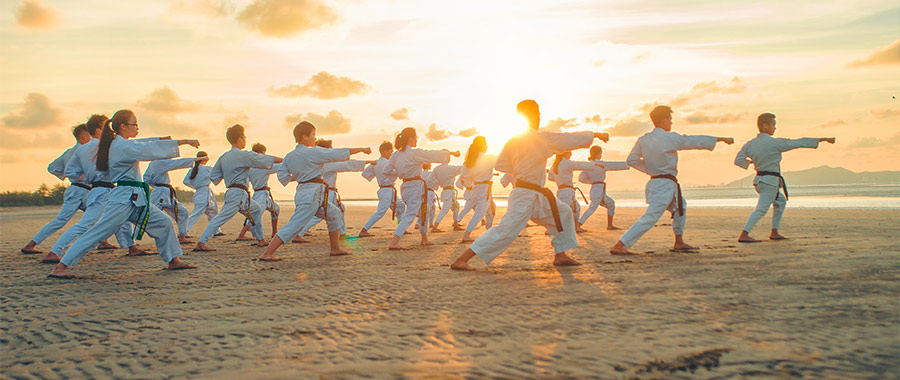In an era marked by the relentless pursuit of both physical excellence and spiritual growth, the fusion of martial arts and spirituality emerges as a compelling prospect. The domain of martial arts is often perceived as a purely physical endeavor, a rigorous regimen dedicated to achieving mastery over the body. However, deeper examination reveals a profound intersection with spiritual principles, particularly within the Bahá’í teachings. This intersection not only invites practitioners to contemplate their approach but also promises a transformative shift in perspective that reverberates through the very essence of their being.
At the heart of Bahá’í teachings lies the concept of the oneness of humankind, an understanding that transcends superficial differences. This aligns seamlessly with the ethos of martial arts, which emphasize discipline, respect, and unity with oneself and others. The practice of martial arts, often steeped in tradition and rich philosophical underpinnings, encourages self-reflection and personal growth. It propels the practitioner to navigate the murky waters of ego, aligning closely with spiritual quests that seek to subdue the self for a higher purpose. Both disciplines beckon individuals to pursue virtues such as patience, humility, and perseverance, nurturing a robust character that is essential for both personal and communal development.
Martial arts, through its disciplined structure, initiates individuals into an arena where mind, body, and spirit converge. The physicality of martial arts can serve as a profound metaphor for internal spiritual battles. Just as one must train the body to learn complex movements or techniques, so too must one cultivate the spirit to navigate the complexities of moral and ethical dilemmas. The exigency of self-discipline in martial arts mirrors the spiritual journey outlined in the Bahá’í faith, emphasizing the importance of personal responsibility and the active pursuit of spiritual truths.
The practice of engaging in martial arts may act as a compelling catalyst for a transformative spiritual experience. The processes of meditation, mindfulness, and focus that are inherent in various martial arts forms cultivate a heightened sense of awareness. In Bahá’í thought, this level of awareness is crucial for understanding one’s purpose and fostering humility. Each martial arts session can serve as an opportunity to reflect upon one’s actions, motivations, and spiritual aspirations. The rituals surrounding martial arts training — from bowing before an instructor to the meditative movements in forms such as Tai Chi — resonate profoundly with the Bahá’í emphasis on the significance of action in the quest for spiritual truth.
Engaging in martial arts could allow practitioners to embody the concept of the ‘spiritual warrior.’ This archetype does not encompass merely physical strength or aggression. Rather, the spiritual warrior is characterized by resilience, compassion, and the unwavering pursuit of justice, virtues that are heavily weighed in Bahá’í teachings. In a world rife with conflict, the teachings advocate for peace and dialogue as pathways toward resolution. Martial arts, perceived through this lens, enables practitioners to tailor their skills toward promoting harmony rather than discord.
Furthermore, the duality of martial arts as both an artform and a combat discipline dovetails beautifully with the dynamic nature of spiritual growth. Each bout, each spar, serves as a crucible in which character is tested. The inevitable confrontation with both opponents and oneself fosters growth that aligns with the Bahá’í aspiration for personal transformation. The act of overcoming both external and internal adversities reveals layers of strength, resilience, and fortitude that are integral to the spiritual journey. The tension between the physical engagement and the contemplative nature of the experience leads to holistic development that is both empowering and enlightening.
The dialogue between martial arts and spirituality becomes even more profound when considering the necessity of community. The practice is often undertaken in groups, fostering relationships built on mutual respect and shared struggles. Within the context of Bahá’í teachings, community plays a pivotal role in spiritual development. The communal aspect of martial arts can serve as an exemplary prototype for Bahá’í collaboration, encouraging open discourse, camaraderie, and a shared commitment to personal and collective betterment.
Ultimately, the synthesis of martial arts and spirituality may lead individuals to a heightened sense of purpose, aligning their physical pursuits with spiritual aspirations. The realization that every kick, punch, or block can represent a step toward greater awareness and understanding paves the way for a profound shift in perspective. Practitioners may discover that the rigorous training and discipline they engage in extend beyond the mat or dojo, influencing their interactions, choices, and overall outlook on life.
In concluding this exploration, it is crucial to consider the broader implications of merging martial arts with the principles of the Bahá’í faith. This interweaving of disciplines not only offers individual practitioners pathways toward personal growth and enlightenment but also promotes a collective advancement toward societal harmony. By embracing the ethos of both martial arts and Bahá’í spirituality, individuals are poised to transform their conceptions of strength, resilience, and unity, ultimately contributing towards a more peaceful world. In this synthesis, the promises of martial arts and spiritual combat converge into a singular realm of holistic development, compelling us to explore the depths of our capabilities — both physical and spiritual.
